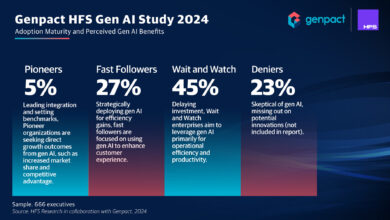Balancing the Benefits, Challenges and Costs In Leveraging The Transformative Power of Generative AI in Electronics Manufacturing · EMSNow

By Harish Lala, Zensar Technologies

Harish Lala, Zensar Technologies
The electronics manufacturing industry, long a hub of innovation, is undergoing a transformative shift with the emergence of generative artificial intelligence (GenAI). Over the decades, technological advancements have consistently driven efficiencies, enhanced quality and expanded the realm of possibilities. Now, Generative AI stands out as one of the most promising developments, poised to unlock unprecedented levels of productivity, foster innovation, and offer a significant competitive edge.
The Benefits of Generative AI in Manufacturing
Slashing Time to Market: Imagine a world where product design and development happen at lightning speed. GenAI can make this possible by leveraging advanced machine learning algorithms to analyze extensive datasets—market trends, customer preferences, and historical performance. This powerful data-driven approach can slash time-to-market and ensures products align with evolving customer needs, delivering a decisive competitive edge.
Advanced Simulations: Furthermore, GenAI enables the creation of digital twins, virtual replicas of physical assets or processes. These digital twins allow for advanced simulations and predictive analysis that can optimize operations, identify potential issues, and test scenarios without production disruption. This significantly minimizes downtime and reduces the need for physical prototypes, resulting in substantial cost savings and operational efficiency.
Higher Productivity: Increased efficiency is another hallmark of GenAI. By automating and optimizing various processes, GenAI boosts operational efficiency, allowing manufacturers to produce more with fewer resources, translating into higher productivity and profitability. Real-time monitoring and analysis enable early detection of defects, ensuring higher quality products, reducing the cost of rework and scrap, improving overall product reliability and customer satisfaction.
Minimizing Downtime: GenAI also excels in predictive maintenance by learning from historical maintenance data and real-time sensor inputs to predict equipment failures before they occur, helping in planning maintenance activities, minimizing downtime, and extending the lifespan of machinery. These same predictive capabilities, when used in a different way, allow manufacturers to respond more swiftly to market changes and customer demands, a crucial advantage in the fast-paced electronics industry.
Improve Inventory Management: GenAI can play a crucial role in supply chain and inventory management. Using natural language processing and interactive analysis tools, supply chain specialists can perform complex inventory analyses with intuitive commands, enabling quick, data-driven decisions. This ensures efficient inventory management and minimizes waste. Additionally, GenAI’s analysis of historical data, market trends, and customer feedback offers valuable insights for production planning and cost-effective opportunities. This data-driven approach streamlines decision-making, optimizes resource allocation, and enhances overall business performance.
Maximizing Sustainability: GenAI can enhance sustainability footprints by optimizing resource usage and reducing waste, contributing to more sustainable manufacturing practices. This is increasingly important as companies strive to meet environmental regulations and reduce their carbon footprint.
Challenges to Overcome
While the potential benefits of GenAI in manufacturing are undeniable, several challenges need to be addressed.
Data management is critical, as GenAI relies heavily on high-quality data to function effectively. Integrating data from various sources and ensuring its accuracy can be daunting. Manufacturers will have to ensure their datasets are clean and well-organized, and invest in upskilling their workforce to effectively leverage GenAI technologies.
Cybersecurity is another concern. The integration of GenAI raises issues about data privacy and the protection of sensitive information and intellectual property. Manufacturers must implement robust security measures and explore the use of synthetic, anonymized datasets to mitigate these risks. Implementing Gen AI will also require a cultural shift within organizations. Resistance to change and a lack of understanding about AI technologies can hinder adoption. Effective change management strategies are essential to address these issues.
Navigating AI regulations, a complex and evolving landscape, can be challenging. Manufacturers must ensure compliance with data protection laws and industry-specific regulations.
Budgetary Implications
The adoption of GenAI in manufacturing impacts various budgets for CIOs and production executives, requiring coordinated planning.
Capital expenditures are first and foremost as implementing GenAI solutions calls for an initial investment in AI infrastructure, such as high-performance computing systems, data storage solutions, and specialized software. While these costs can be significant, they are often offset by long-term savings generated by improved efficiencies and reduced waste.
Operational expenditures can also be affected, but in a cost-savings way. GenAI can lead to lower operational costs by automating repetitive tasks, reducing material waste, and minimizing downtime through predictive maintenance. The reduction in labor costs and improved resource utilization contribute to overall operational savings.
Training and development costs must also be considered. Integrating Gen AI into manufacturing processes necessitates upskilling the workforce. Training programs for employees to effectively use and maintain AI systems are essential and should be factored into the budget. However, the benefits of having a more skilled workforce capable of leveraging advanced technologies are substantial.
Future Outlook
Despite the challenges, the future of GenAI in manufacturing is exceptionally promising. As this technology continues to evolve, its applications will expand, driving unparalleled efficiencies, cost savings, and innovation across the industry. Early adopters of GenAI will secure a significant competitive edge, establishing themselves as leaders in the era of smart manufacturing. Collaborative efforts between AI developers, manufacturers, and regulatory bodies will be crucial in overcoming obstacles and fully realizing GenAI’s potential.
Generative AI is set to revolutionize the manufacturing industry. By optimizing product design, enhancing quality control, streamlining supply chain operations, and enabling data-driven decision-making, GenAI empowers CIOs and production executives to achieve new levels of operational efficiency, cost savings, and innovation. Embracing GenAI can propel organizations toward a future of sustainable growth and success, solidifying their position at the forefront of modern manufacturing.
About the Author: Harish Lala is the Executive Vice President and Head – Hi-tech Engineering and Africa at Zensar Technologies, a leading global IT services firm.



